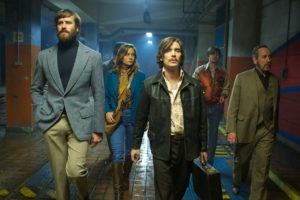
The Florida Project begins with an eye-catching mauve motel wall with italicized credits flashing by as Kool & the Gang’s “Celebration” plays. For those who have never been to Kissimmee, Florida, have never stayed at one of its many hotels and motels, and have never interacted with any number of people in the area, being a tourist in this world might be appealing. Living in a week-to-week motel, struggling to pay the rent while raising a child and being looked upon condescendingly by everyone because of your income status, is not. Filmmaker Sean Baker is interested in showing a very limited collection of folks on the lower-end of the United States’ socioeconomic hierarchy, and the result feels a lot like class tourism.
Abruptly cutting the tune short, Baker throws us straight into the daily lives of the folks who live in Kissimmee’s Magic Castle Inn & Suites. To their credit, Baker and cinematographer Alexis Zabe capture only splashes of Kissimmee. There’s the familiar helicopter rides, gift shops, and tourist traps, but it’s all so quiet and impersonal in a city that’s vibrant and loud. It’s pretty, but it’s staged in a dispassionate manner. One could argue that were it not for the brief flirtations with Walt Disney World peppered through the script, this film could take place anywhere. Worse than that, while all the sex, the poverty, the drug use, and the haphazardness of the individuals inhabiting this motel feel real, The Florida Project has nothing to say about them.
The title alone feels like a joke gone wrong, the kind of thing that makes you wonder if A24’s marketing team has force-fed the world a film that promises wonder only to trick them into watching a film about what the filmmakers think are the projects of Kissimmee. Annoyingly, it worked; one critic has already said that the film is selling “the darker side of Disney World,” ignoring that what we see here is what exists in many American cities. Yes, some people are poor and struggle to make ends meet. No, filming this and trying to shock the audience is not revelatory. It’s exploitative.
Both of Baker’s previous films, Starlet and Tangerine, boasted solid-to-talented actors, most of whom were non-professionals and had genuine chemistry. Of the latter, Mya Taylor and Kitana Kiki Rodriguez were the life of the film, guiding their narrative with charisma, even when the film got distracted elsewhere. As an 88-minute film, Tangerine‘s brevity is sorely missed with The Florida Project, which clocks in at 115 minutes. This runtime is primarily split between three individuals: Moonee (Brooklynn Price), Halley (Bria Vinaite), and Bobby (Willem Dafoe).
As many critics have stated, the film supposedly returns one to their childhood. Sadly, childhood is abysmal to watch unfold over two years. Moonee and her friends do a whole lot of nothing over and over again. They spit, they run, they look at cows, they gawk at an old woman’s breasts from afar, they share ice cream. Of her friends, only one had any personality, and he’s quickly set aside for another who was likely given no direction other than “stare aimlessly.” Even in the film’s most climactic moment, Baker cuts back and forth between an empty stare from a friend and Price’s tears, creating something that just feels uncomfortable and laughable instead of raw and impacting as it’s clearly intended to be.
But Moonee’s perspective is often set aside to focus on her mother. As Halley, Vinaite is the sole non-professional of the bunch who is somewhat interesting to watch, be it due to the tattoos that cover her body, her aloof nature, or maybe some sort of “it” factor that drew Baker to her. The adults around her all give her nothing, except when she (or anyone else) is placed alongside a performer like Dafoe or Macon Blair (who pops up for a few minutes). Her entire narrative arc shows a woman forced to do “bad” things to pay the rent while also mistreating every single human being around her. An abundance of scenes feature her smoking, beating the shit out of someone, engaging in sex work with her daughter in the bathroom, and generally disrespecting other people. These moments that strive for realism are paired with flashes of her being halfway decent. She’s doing it all for her kid, you see. That means we’re supposed to care. It’s a thin veil that Baker and co-writer Chris Bergoch have put on to disguise the fact that there’s no story here and that the film has nothing to say about what it’s depicting.
For all its attempts at being real about its depiction of “the struggle,” Willem Dafoe’s Bobby is the most painfully unrealistic character we’re forced to watch. Coasting by, Dafoe is being lauded for every close-up of his kind eyes, full of pity for the poor people. He’s meant to be our proxy; frustrated that these children are doing childish things, angry with a mother who would dare to be a sex worker (while her child is in the bathroom, no less), but ultimately sympathetic to their plight, to an extent. The heavy-handed addition of Caleb Landry Jones as his son is the worst aspect of his arc. Jones’ sole purpose is to remind the audience that Bobby has a heart and understands the struggle of parenthood while dragging an ice machine down a hallway at a glacial pace.
Arguably, Baker and Bergoch are simply painting a picture of what it’s like to be living week-to-week in central Florida, not knowing if you and your kid are going to be out on the street. But, in keeping it so small scale, there’s never really any kind of commentary made on how the system keeps these individuals down. Then there’s the claim that the intent was to place us back into childhood. If so, why focus on the adults quite as much, pulling away from that admittedly aggravating children’s POV? In this way, it’s not insular enough, and yet it’s such an insular film that it feels like the audience is being poked and prodded by aggravating kids until they’re manipulated into caring for them, for one brief instant.
There are moments of relief that don’t feel manufactured; a boy watching TV in bed because he’s forbidden from joining his friends; kids snickering from a distance as a woman goes topless; a woman using a slow cooker in a tiny room to feed her family. If anything, it’s the people surrounding the main duo that are genuinely interesting to look at. They’re used as decoration though, not a single one of them getting developed further than “poor” and “getting by.” And it’s a shame because there’s a story to be told about folks living around here, but there’s something uncomfortable about the way the filmmakers otherize these things they see as “ghetto” and “ratchet.”
Practically any ounce of realism is done away with when faced with an ending that’s totally miscalculated and indulgent. Presented as an uplifting tonal shift of fantasy after two hours of poverty, it makes it hard not to yell, “Are you fucking kidding me?” It’s an extra-harsh slap to the face after an eternity of monotony, of missed opportunities to engage the audience, of wasted talent (like Sandy Kane’s terrific Gloria, someone you could laugh with instead of at). The Florida Project is such an aimless, mess of a drama, and so painfully unsure of what its themes could be, that it could make someone reconsider whether or not Starlet and Tangerine were any good.
—
Directed by Sean Baker; written by Sean Baker & Chris Bergoch; starring Brooklynn Price, Bria Vinaite & Willem Dafoe; 115 minutes.
The Florida Project is now undergoing a limited theatrical release. In Miami, it screened at Tower Theater as part of Miami Film Festival’s GEMS line-up on October 5th & will premiere October 20th at O Cinema Wynwood, among other theaters.



 Derek
Derek
 Isabelle
Isabelle